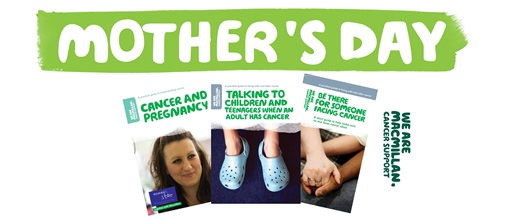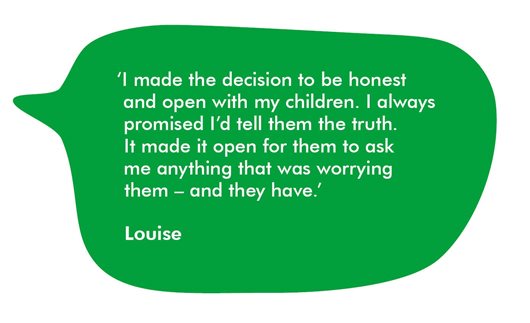
Mother’s Day can be a difficult and emotional day for many people. In this blog, our intern Emily talks about how families can be affected by cancer and where to find support.
For many, Mother’s Day can be a challenging time. It may be your first year without a loved one or a time of uncertainty for your family. Whatever your situation, you are not alone and we have information and support to help you cope.
Coping with bereavement
If you have lost your mum to cancer, you may be experiencing many emotions, including grief, anger and sadness. The same goes for losing a child. Mother’s Day may bring back many memories, both happy and sad. We have lots of information on coping with bereavement and a booklet you may find helpful. Here are a few suggestions that may help this weekend:
Some people may find a simple act of memorial a helpful way to cope on days like Mother’s Day. This could be visiting a special place or sharing memories with family and friends. You can also share memories of your loved one and find support by joining our Online Community.
Mums going through cancer treatment
It can be difficult to find the right words when supporting someone with cancer. Simple ways to show that you care can go a long way, not just on Mother’s Day. Here are just a few ways you can show your support:
For more guidance on how to help someone on their cancer journey, our Be there for someone facing cancer booklet can be a great place to start.
Expectant mothers diagnosed with cancer
Learning that you are going to be a parent is daunting enough, but if you are going through cancer treatment, your emotions may be complicated. You are likely to feel anxious about your own health and the baby’s. Taking care of yourself and feeling supported is very important.
You can visit our cancer and pregnancy information page for more support about dealing with cancer during pregnancy. You can also read Polly’s story here.
Talking to children
If you are a mum living with cancer, you may be experiencing worry and uncertainty about the future. It is normal to try and protect your children from your health problems. You may worry about how they will react to you having an illness.
Deciding to talk to your children about your cancer can feel like a big step, but being honest about your health will help them better understand what is going on. Talking to your children about cancer can:
If you need advice about talking to your children, visit our website. You can also download our booklet Talking to children and teenagers when an adult has cancer from our website.

However you’re feeling this weekend, please remember that support is always available. All our information is free to download on our website be.macmillan.org.uk
If you fancy a chat instead, you can speak to the Macmillan Support Line for expert advice and support. Call us free on 0808 808 00 00 (Monday to Friday 9am to 8pm).
To see what else Macmillan's cancer information team has been blogging about, please visit our blog home page! You can subscribe to receive our blogs by email or RSS too.
We're with you every step of the way
The Macmillan team is here to help. Our cancer support specialists can answer your questions, offer support, or simply listen if you need a chat. Call us free on 0808 808 00 00.
Comments? Feel free to add them below (you need to be logged in).
Keep in touch Follow Macmillan’s cancer information team on Twitter @mac_cancerinfo
Whatever cancer throws your way, we’re right there with you.
We’re here to provide physical, financial and emotional support.
© Macmillan Cancer Support 2026 © Macmillan Cancer Support, registered charity in England and Wales (261017), Scotland (SC039907) and the Isle of Man (604). Also operating in Northern Ireland. A company limited by guarantee, registered in England and Wales company number 2400969. Isle of Man company number 4694F. Registered office: 3rd Floor, Bronze Building, The Forge, 105 Sumner Street, London, SE1 9HZ. VAT no: 668265007